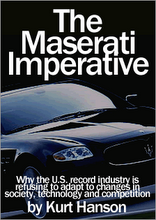Well, that's the feeling I got yesterday when I read the five-page letter from Representatives Howard Berman (D-CA) and Howard Coble (R-NC) to SoundExchange Executive Director John Simson:
Something doesn't seem right about it.
"Tell me something I don't already know"
Previously, what had caught my eye was this: Included in Monday's SoundExchange press release on the topic was the following sentence attributed to Berman and Coble:
"In return for compelling sound recording copyright owners to make their works available, the qualifying services agree to meet the terms and conditions of the compulsory license, which, inter alia, requires the periodic filing of statements of account and the timely payment of statutory royalties."First, who writes like that? (Well, lawyers, obviously, but still.)
Second, why would Berman and Coble feel obligated to tell John Simson something like this that he obviously already knows?
The only answer I could come up with is that SoundExchange wanted Berman and Coble to make that point... so they could use the quote in their press release.
But wait, there's more!
Later in the week, I was able to obtain a copy of the Berman-Coble letter, as SoundExchange apparently distributed copies to some journalists.
And it got weireder: The Berman-Coble letter is actually a five-page letter encouraging Simson to "immediately initiate good faith private negotiations with small commercial and noncommercial webcasters."
But rather than being an admonishment to do so, Berman and Coble actually spend the vast majority of the letter selling Simson on the reasons that the CRB process was fair and the judges' decision was good.
And the salesmanship is strong! Here's a choice quote:
"The CRB's final rule provides annual adjustments in the royalty rate for commercial webcasters. Over time, these adjustments would result in a graduated increase from .0008 cents per performance in 2006, which amounts to less than a 5% increase from 2005 to 2006, (emphasis added) to .0019 cents per performance in 2010."What the...?! If two key members of the House Judiciary committee are writing a representative of copyright owners to ask him to negotiate a lower rate for certain classes of webcasters, why would they spend valuable time and effort writing about how low the existing rates are?
And why would they play up, in a letter to Simson, the one data point he's been using himself for the past two months?
(Note that Simson never mentions the 38%, 27%, and 29% increases in each of the next three years. Nor, coincidentally(?), did Berman and Coble to him.)
Applying Occam's razor
"Occam's razor" says that the simplest explanation is probably correct. So let's try that approach.
Let's imagine for a moment that SoundExchange was feeling the pressure of growing support for the Internet Radio Equality Act -- Congress beseiged by e-mails, faxes, and phone calls from webcasters, musicians, and listeners; dozens of co-sponsors signing up for the bill; the NAB throwing in their support on Friday -- and that they wanted to derail its momentum.
One optimal way of doing it might be to cut a deal with the two classes of webcasters that you believe are getting the most sympathy from journalists and driving much of the pressure from constituents, yet comprise only a tiny portion of royalty payments you receive: Small webcasters and non-comms.
And what better way to present that plan than to say it was "at the request of Congress" (even though it was technically only at the request of two Congressmen who, based on their past voting history, likely would have OPPOSED the Internet Radio Equality Act)?
And better yet, what if the request "from Congress" was a five-page letter filled with every point you wanted made in support of the CRB decision? Score!
"Sign here, please"
To me, that's the only explanation that makes any sense.
Let's assume, reasonably, that Berman and Coble's staffs have good relationships with the RIAA and SoundExchange. Suppose someone at the RIAA or SoundExchange drafted a letter (A) defending the wonderfulness of the CRB decision and (B) asking SoundExchange to negotiate with the two minor subgroups of webcasters that SoundExchange wanted to negotiate with.
So Berman and Coble affix their signatures. Then, almost simultaneously, SoundExchange has (A) an "confidential" offer letter drafted to small webcasters (although the "offer" is missing key terms; like if I "offered" to buy your used car but said we'd work out the price later) and (B) a press release that goes out five minutes after the "confidential" "offer" is delivered to the small webcasters.
It's the only explanation that I believe explains the content and tone of the Berman-Coble letter.
Nonetheless, a step in the right direction
Obviously, if SoundExchange is starting to "value the diversity of programming offered by webcasters" (as "Berman" and "Coble" wrote) and is willing to offer interim royalty rates that help some webcasters avoid bankruptcy, that's good.
And if SoundExchange feels they need the cover of characterizing it as "responding to a request from Congress"?
Well, whatever. You do what you gotta do.




1 comment:
Kurt - Just what is it in this world of DC nonsense you don't believe is kosher?
How no one talks about how the artists will get paid? Ever?
Looking forwared to your later posting! --Greg
Post a Comment